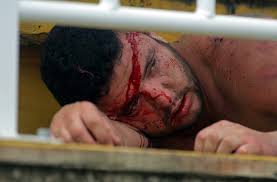By Andrew Warshaw
December 10 – FIFA and World Cup organisers have been quick to re-assure an anxious public that the shocking scenes of violence at a Brazilian championship game at the weekend, screened across the world, were far removed from what can be expected next summer.
Fans fought running battles at the Atletico Paranaense versus Vasco da Gama match on the final day of the Brazilian championship amid local reports that at least 30 fatal incidents have now taken place in and around Brazilian stadiums this year alone.
Sunday’s game had to be halted for 70 minutes as players broke down in tears watching rival fans trading blows. There were no police inside the stadium at the time because the home side had opted to hire private security guards.
The Brazilian Sports Ministry condemned the violence and called for swift punishment. “I can assure you the lamentable scenes we saw yesterday will not be seen at the World Cup,” said Andrei Rodrigues, the special secretary of major events at the Justice Ministry.
“We can assure you that the stadiums at the World Cup will have at least 200 camera feeds providing real time video and what happened yesterday cannot happen at the World Cup.”
According to Lance, Brazil’s best-selling sports newspaper, 234 people have been killed in connection with football violence since 1988. Although World Cup fans will watch games in a safer and more comfortable environment, FIFA admitted the weekend violence, coming just 48 hours after the draw for the World Cup finals, was “very sad for Brazilian football”.
“FIFA and the local organising committee condemn any form of violence and such incidents should not happen in any football stadium,” a statement said.
FIFA, like the government, was quick to point out that the 12 new or totally modernised stadiums being used for the World Cup will feature far more intensive and sophisticated security inside and outside grounds than at domestic level.
“For the 2014 FIFA World Cup a very comprehensive security concept is in place in an integrated operation between private and public security authorities to ensure the safety for fans, players and any other stakeholder involved in the event.”
“The concept has worked very well during the FIFA Confederations Cup (in Brazil this year) and is built on models used at previous FIFA World Cups.”
Yet Mauricio Murad, a Rio de Janeiro sociologist who wrote a book on football violence, said the current trend of violence was a huge worry. “Something has changed, and for the worse,” he was quoted as saying. “Over the last five or six years violence inside stadiums was under control and it was only bad outside the grounds. What we’ve seen over the last few weekends is a return to violence inside the stadiums.”
Contact the writer of this story at moc.l1745306585labto1745306585ofdlr1745306585owedi1745306585sni@w1745306585ahsra1745306585w.wer1745306585dna1745306585

